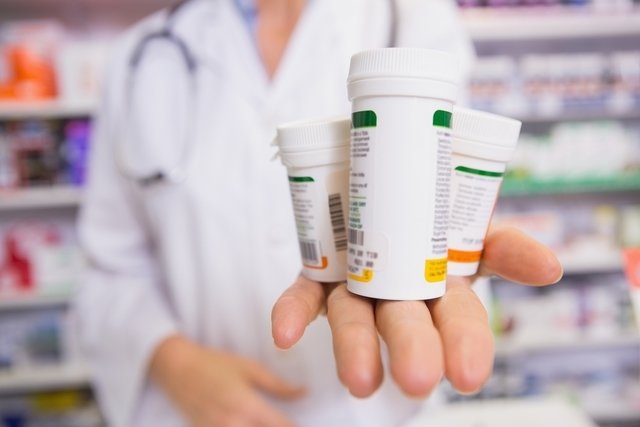Medicines for gastric ulcers, such as omeprazole, cimetidine or antacids, help reduce stomach acidity and thus prevent ulcers from developing. Furthermore, they are used to cure or facilitate the healing of ulcers and prevent or treat any inflammation in the mucosa of the gastrointestinal tract.
A gastric ulcer is an open wound that forms in the stomach that can be caused by different situations, such as poor diet or bacterial infection, for example, resulting in symptoms such as stomach pain, nausea and vomiting. Know how to identify all the symptoms of gastric ulcers.
Anti-ulcer medications should only be used with the advice of a gastroenterologist, depending on the cause of the acidity and ulcer, after carrying out tests such as endoscopy.
Main antiulcer drugs
The main antiulcer medications that may be recommended by your doctor are:
1. Antibiotics
Antibiotics, such as clarithromycin, amoxicillin, tetracycline, metronidazole or levofloxacin, for example, may be recommended by the doctor in cases of stomach ulcers caused by an infection with the bacteria. Helicobacter pyloriafter carrying out diagnostic tests, such as endoscopy, and detecting the bacteria in the stomach.
Generally, two types of antibiotics are used in treatment, associated with a proton pump inhibitor, such as esomeprazole, lansoprazole or omeprazole, and/or an antacid, such as bismuth subsalicylate, for approximately 7 to 14 days of treatment, as per medical advice.
Antibiotics can cause side effects such as diarrhea, vomiting, poor digestion, nausea, abdominal pain, skin reactions, headache, taste changes and insomnia.
2. Proton pump inhibitors
Proton pump inhibitors, such as omeprazole, esomeprazole or lansoprazole, for example, are indicated for the treatment of gastric ulcers as they act by reducing the production of acid in the stomach, by inhibiting the proton pump present in the cells of the stomach wall. This way, the stomach is less attacked by stomach acid, allowing ulcers to heal.
These medications should be used under the advice of a gastroenterologist as they can cause side effects such as kidney problems, headache, diarrhea, formation of bumps on the skin, abdominal pain, excessive production of intestinal gas, nausea, constipation or vitamin B12 deficiency. .
Furthermore, prolonged use of these medications can increase the risk of bone fractures, in the hips, wrist or spine, for example.
3. Histamine receptor antagonists
Histamine receptor antagonists, such as cimetidine, nizatidine or famotidine, are a class of medicines that act by reducing the production of acid in the stomach, by binding to regions in the cells of the stomach wall, preventing the action of histamine, which when activated increases acid production.
Therefore, histamine receptor antagonists can be recommended by the gastroenterologist to reduce stomach acidity and facilitate ulcer healing.
The most common side effects caused by the use of these medications are diarrhea, headache, drowsiness, insomnia, tiredness, muscle pain, dizziness, vertigo or constipation.
4. Gastric protectors
Gastric protectants, such as sucralfate, form a protective barrier in the stomach lining over ulcers, preventing acid from damaging the stomach wall, promoting healing.
The most common side effects caused by gastric protectors are darkening of the stool, dizziness, headache, dry mouth, nausea, vomiting, diarrhea or constipation, the formation of bumps on the skin or psychotic disorders.
5. Antacids
Antacids, such as aluminum hydroxide, magnesium hydroxide, calcium carbonate or sodium bicarbonate, act by quickly neutralizing stomach acid, causing the stomach to be less attacked by the acid, temporarily relieving the pain and discomfort caused by gastric ulcers. .
However, antacids do not cure gastric ulcers, they only help to temporarily relieve gastric ulcer pain, and should only be used if recommended by a gastroenterologist, as excessive or long-term use can cause rebound acidity, which is when the stomach enlarges. the production of acid by noticing that the acidity has decreased and, therefore, the discomfort of the ulcer may worsen.
Furthermore, antacids can cause side effects such as diarrhea or kidney problems, and their use for more than 2 weeks is not recommended.
Another antacid that may be recommended by your doctor is bismuth subsalicylate, especially in cases of gastric ulcer caused by the bacteria. H. pylorias in addition to reducing stomach acidity, it also helps to reduce stomach inflammation and has bactericidal action, and is normally used in association with antibiotics and proton pump inhibitors.
Read too: Rebound effect: what it is, symptoms, causes (and what to do)
When to take
Antiulcer medications are recommended by the gastroenterologist in case of:
- Peptic ulcer;
- Gastritis;
- Ulcerative gastroduodenal disease;
- Gastroesophageal reflux;
- Duodenal ulcer;
- Zollinger-Ellison syndrome.
Generally, these health conditions can cause pain or discomfort in the stomach, which is why the doctor recommends the use of anti-ulcer medicines to prevent or treat ulcers. See what the main causes are and how stomach pain is treated.
Depending on the symptoms, the doctor recommends the medication with the most appropriate mechanism of action for the situation, which could be a proton pump blocker or gastric mucosa protectors, for example.
Who shouldn’t use
Antiulcer medicines should not be used by people who are allergic to any of the components in the medicine formulas, or who have serious liver or kidney problems.
Furthermore, in the case of children, pregnant or breastfeeding women, these remedies should only be used if recommended by a doctor after evaluating the risks and benefits of the treatment.
Care during treatment
During the treatment of stomach ulcers, some precautions are important, such as:
- Taking medicines at the correct timesas advised by the doctor;
- Avoid taking medication on your ownespecially anti-inflammatory drugs;
- Avoid smoking or consume alcoholic beverages;
- Avoid consuming spicy foods or very spicy, as they can worsen symptoms;
- Avoid stresstaking time to rest or practicing physical activity to relax.
Furthermore, it is important to follow a balanced, healthy, easily digestible diet low in fat and sugar, guided by a nutritionist, including foods rich in fiber, such as fruits, vegetables and fresh vegetables, for example. See an example of a menu for gastric ulcers.

Sign up for our newsletter and stay up to date with exclusive news
that can transform your routine!
Warning: Undefined array key "title" in /home/storelat/public_html/wp-content/plugins/link-whisper-premium/templates/frontend/related-posts.php on line 12
Warning: Undefined array key "title_tag" in /home/storelat/public_html/wp-content/plugins/link-whisper-premium/templates/frontend/related-posts.php on line 13




